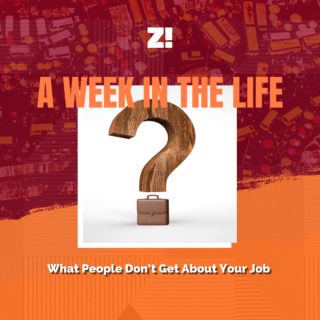“A Week in the Life“ is a weekly Zikoko series that explores the working-class struggles of Nigerians. It captures the very spirit of what it means to hustle in Nigeria and puts you in the shoes of the subject for a week.
For nine hours every day, 26-year-old Daisy* calls 180 loan defaulters to get them to pay up their debts. But when she’s overlooked for a promotion after two years, she starts doing the bare minimum while she figures out her next career move.

MONDAY
My typical day starts at 7 a.m., but I go back to sleep and wake up fully by eight most days. If I had to go to the office, I’d wake up at six and leave my house at seven. But thank God my company now lets people like me, who’ve been on the job for a long time, work from home.
I take my bath and do skin care — even though I work from home, it’s annoying that I have to use sunscreen, according to skincare experts. SMH. Then I hotspot my smartphone to my laptop and get ready to get through the day. My work is straightforward: I ask customers to pay up their gbese. I’m pretty much a call centre agent, so when a call comes to me, it’s because a customer has picked up and I’m an available agent.
I interact with customers until 6 p.m. when I log off. 5 p.m. is the official closing time, but everyone is used to working until six because, targets. If I need to take breaks, they have to be for less than 30 minutes each. But I can’t complain.
After work, I’m too tired to do anything, so I fry eggs, drink tea or order food. I don’t have time to cook a full meal because of my limited break time. I spend the rest of the night social media-ing, and catching up on texts and calls from friends, before going to bed around 11 p.m.
TUESDAY
At 8:50 a.m. when I sat at my desk to meditate before my first call today, I thought about how my target used to be 150 calls per day. It soon increased to 160. As the company continued to expand, they increased the loan collection targets till I was making 180 complete calls per day — a complete call means I dialled, the customer picked, and I introduced myself: “Hi, my name is Daisy. I’m calling you from [insert company name].”
The day flies by as I take call after call and try to keep my cool because I’m not a very patient person. Word on the gossip line is the company has struggled to raise funding recently. It seems the company’s runway is depleting, and so, there’s serious pressure to recover as much money from debtors as possible.
My company used to outsource loan collections to an agency I worked for, but during COVID, they terminated the contract, and I got laid off. Then I applied to join the company’s in-house collections team and got in. At first, I was a high performer, hitting my targets and winning departmental awards. But after personnel changes and reviews, the workplace became toxic.
The turning point was when I got passed on for a promotion. As one of the founding members, I’d been recommended by a team lead and even worked in the marketing team temporarily. I was enjoying my new role upstairs, and for three weeks, I thrived. Then HR came from nowhere and said they weren’t aware of the arrangement, and they’d already hired two people for the role. They sent me back to the loan collection team. I was devastated. Since then, I’ve been on autopilot.
They made things worse by encouraging competition to the point of toxicity. People would come to work from 7 a.m. to 6 p.m. because the more calls you make, the higher your chances of recovering money. All this just so they could meet targets and get paltry bonuses. I did it for a while and would earn an extra ₦45k here or ₦60k there. But the payment didn’t match the effort.
That’s why they’re expanding the loan collection team from the current 65 people to 100 by the end of the year. So I expect the targets to keep increasing. Things are bad, and the economic downturn in the country means people aren’t making enough to pay back their loans. This makes the work much harder for us, and we’re scared of being laid off.
WEDNESDAY
Omo. Today, I lost my shit. I understand people are struggling, but please na. I already hate when they assign me late buckets — people more than one month overdue — but this guy who’d defaulted for 35 days and counting was still doing anyhow. I’m supposed to ask why they’re delaying payments, and then, figure out a way to get them to “drop something”.
But this guy hadn’t shown any commitment, by making a part payment or even extending his loan. So I told him, “How much can we get from you today, Mister man?! Me too, I used to borrow money na. What’s all this?”
I get the late bucket customers because I’m one of the more experienced people on the team, but nobody pays me for the extra stress. Loan defaulters can be so annoying. They feel like we debt collectors can’t do anything because the company’s penalties are lenient. We only charge them a tiny percentage in late payment fees for a week, and then, we attempt to auto-debit their accounts. But these sneaky people leave their accounts empty.
What we do is flag them as credit defaulters, but most ordinary Nigerians don’t even care. Only those trying to leave the country or who need good credit scores to run businesses do. But those kinds of people rarely default on their loans.
When I’m introducing myself to customers, I have to prepare myself because, depending on their mood, conversations can go south very quickly. Sometimes, it’s difficult to stick to the script.
I’m not proud of going off on that guy today. But sometimes, when they start moving mad, I want to give it back to them hot-hot. Our calls are recorded, and my quality assurance (QA) score will surely take a hit, but we move.
THURSDAY
Today, there’s gossip going around that the company’s trying to review the bonus structure again, but I don’t even care. The base pay for my role is ₦110k monthly. Just as recently as three months ago, people got up to an extra ₦80k if they met three key performance indices (KPIs): QA score, output and recovery.
The old system was something like this: If my team calls 1m customers, we’re supposed to recover at least 70% of the debt. If I call 3k customers in a month and they were owing ₦3m, I must recover at least 70% of the money. If I hit my 70% target, and my team meets its 70%, it means I’d meet the recovery KPI.
I also need a QA score of 90%, which is measured by following the call script, being empathetic, maintaining a certain tone of voice and requesting complete or part payments. This has been my biggest issue as I usually score between 82% and 89%. I don’t care about customers’ reasons for defaulting payment. Just pay the money you owe.
Before my first short break at around 1:30 p.m., I called a debtor, and before I even finished introducing myself, she’d started shouting, “Ahn ahn! I already told you people I don’t have any money. Please please please, you people should let me rest. Your colleague called me yesterday and the day before yesterday. Why will you be calling somebody every day?”
Wait o, am I not supposed to ask them for the money they promised to pay? Shey she dey whyne me ni? Is she the only person who’s ever borrowed money? What kind of nonsense is this na? When I dropped the call, I knew I was going to score zero on QA, but God no go shame me.
Some defaulters even lie that they’ve paid and there must be something wrong with our app. Mad people.
All this stress and they’re still changing the rules. The most recent one was them introducing some kind of tier system for bonuses. Basically, even if you meet your 180 calls per day and score above 90% in QA, if you didn’t recover up to 70% of the top performer’s recovery in the team, your other two metrics have gone to waste. It’s things like these that cause unhealthy competition and working conditions.
We wouldn’t go for breaks just because we were trying to meet targets. Some people didn’t even have time to eat; they’d bring food to work and take it back home. Even me that likes to talk, my mouth was paining me.
I no longer give a fuck about the job. Imagine doing backbreaking work nine hours a day, for ₦110k a month with bonus wey no even sure. You recover millions for a company, but your money or career isn’t increasing or improving.
I’d hoped I’d grow in the role and, in two years, become a team lead or get into project management or digital marketing or something. But I’m stuck in the same role, and there’s not much room to grow, so I have to start looking out for myself.
These days, I’m just doing enough to not lose my job. I won’t do more than I’m paid for because fintech won’t kill me for my mother. All the OGs are already leaving the company. I’m just biding my time while I figure out my next move.
FRIDAY
I’m always grateful for Fridays because I’m a social butterfly. Work may weigh me down, but when I turn up? I turn up. As I turn on my laptop, all I’m looking forward to is close of work so I can go to SOUTH and unwind. I’m tired. All my body needs right now is their Long Island. The thought of it is the only thing that’ll get me through the day.
While I’m having lunch and taking a break from those annoying loan defaulters, I think about trying new things and keeping at them. In the recent past, I’ve tried project management. I finished the course, but I got bored when it was time to apply my knowledge. I’ve also tried data analysis, SQL and digital marketing, and now, I’m about to complete a course in virtual assistance. Maybe my experience in customer relations and communication would help me thrive in that role.
I often think I don’t have the grit to succeed, but maybe I’m just scared of starting over in an entry-level role. I don’t know again abeg. Too much thinking and too little time. I finish eating and get back to work.
My weekend afternoons are for the virtual assistant course I’m taking. Evenings are for “we outside”. When next Monday comes, I’ll face it bravely.
Check back for new A Week in the Life stories every first Tuesday of the month at 9 a.m. If you’d like to be featured on the series, or you know anyone interesting who fits the profile, fill out this form.




